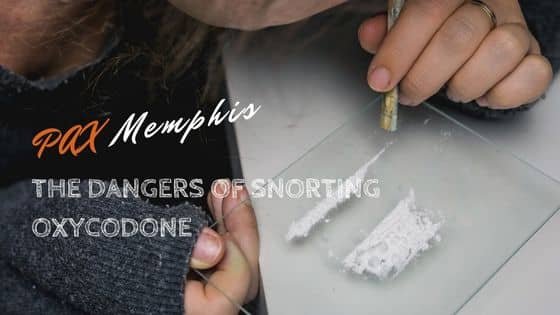Oxycodone is a semi-synthetic opioid medication used to treat moderate to severe cases of pain. While this medication is effective in helping patients overcome their symptoms of pain, it is known to be habit-forming and highly addictive. When someone becomes addicted to oxycodone, they are at an increased risk of suffering from an overdose.
According to the National Institute on Drug Abuse, there were 80,411 overdose deaths involving opioids like oxycodone in 2021.[1]
Typically, when people take oxycodone they swallow the pill. However, some individuals may begin snorting the substance to experience the effects faster. Unfortunately, snorting oxycodone only increases your risk of experiencing dangerous effects such as damage to your nose, addiction, and life-threatening overdoses.
Why Do People Snort Oxycodone?
When someone becomes addicted to oxycodone, their body begins to become tolerant of the drug, so it will not affect them as intensely as before. People often start changing their method of administration to increase the psychoactive effects of their oxycodone.
People who once were swallowing oxycodone pills eventually move on to either smoke, snort, or inject it. If you snort oxycodone, it gets into your bloodstream faster and produces more potent effects. While injecting oxycodone is the most dangerous way to abuse the drug, snorting it is not safe either.
The Dangers of Snorting Oxycodone
Snorting oxycodone is far more dangerous than swallowing the drug. Because snorting a substance creates tiny cuts in your nasal passages, it increases your risk of contracting blood-borne diseases like hepatitis or HIV. Insufflation (snorting) can also lead to other types of infections in your nose.
The main dangers associated with snorting oxycodone involve damage to the nose, lungs, and respiratory system. The impacts of these health concerns range from mild to life-threatening, including:
- Hepatitis C or HIV
- Chronic sinus infections
- Frequent nose bleeds
- Headaches
- Sleep apnea
- Congestion
- Losing your sense of smell
- Lung infections
- Pneumonia
- Sores in the nose and mouth
- Difficulty swallowing
- Abdominal pain
- Losing consciousness
- Life-threatening overdoses
Being aware of the dangers of snorting oxycodone can motivate you to get the help you need, preventing you from experiencing any of the life-threatening or long-term effects.
Damage to the Nose
Regularly snorting oxycodone can cause extensive damage to your nose. Even a single use could lead to swelling of the inner lining of your nostrils, lung infections, nasal blockages, and a compromised respiratory tract. (Klonopin)
Once you have been snorting oxycodone for a long time, you are at risk of more serious and long-term nasal issues. According to the Canadian Dental Association, “Repeated snorting sets up a cascade of ischemia, inflammation, micro necrosis, infection, and then macro-necrosis leading to perforation.”[2]
Snorting oxycodone could lead to the following:
- Holes in the septum
- Perforations in the roof of your mouth
- Nasal ulcers
- Infection in your nasal cavity and lungs
- Weakened blood vessels can lead to brain aneurysms
Addiction
Because snorting a drug increases its potency and shortens the high, you may begin to routinely snort oxycodone to maintain the effects you desire. This means that you will develop an addiction to the drug much faster than someone who is simply swallowing a pill.
The signs of oxycodone addiction include:
- Taking larger amounts of oxycodone over time
- Spending a lot of time obtaining, using, and recovering from the use of oxycodone
- Inability to complete home, school, and work responsibilities
- Continuing to abuse oxycodone despite facing relationship issues
- Needing more of the substance to experience a desired effect
- Experiencing withdrawal symptoms when you cannot snort oxycodone
- Giving up previously enjoyed activities to abuse oxycodone
- Attempting to quit using the drug but being unsuccessful
If you or a loved one display the symptoms of oxycodone addiction, you must attend a drug rehab program. While oxycodone is a prescription medication, being addicted to this substance is extremely dangerous, and long-term abuse can lead to fatal overdoses and significant damage to your nose and lungs.
Respiratory Failure, Coma, or Death
Oxycodone is a central nervous system (CNS) depressant, which means taking too much of the drug can cause respiratory failure, coma, or death. The risk of overdosing on oxycodone is much greater if you mix it with other CNS depressants, like alcohol.
The symptoms of an oxycodone overdose include:
- Small, pinpointed pupils
- Bluish tint on lips and skin
- Vomiting
- Slow pulse
- Seizures
- Low blood pressure
- Extreme drowsiness
- Coma
- Respiratory failure
If you or a loved one are displaying the symptoms of an oxycodone overdose, contact emergency medical services immediately. The first responders can provide you with naloxone, an opioid overdose reversal medication that can save your life.
Find Help for Oxycodone Abuse and Addiction
Oxycodone abuse and addiction can be extremely dangerous, especially if you are snorting the drug. Long-term oxycodone abuse can lead to a wide range of complications, including fatal overdoses. If you or a loved one abuse this drug, consider finding help from a drug rehab center near you.
At PAX Memphis, our team of qualified admissions specialists is available now to assess your needs and help you find the right opioid addiction treatment center. Call now to get started.
References:
Medically Reviewed: September 25, 2019

All of the information on this page has been reviewed and verified by a certified addiction professional.










